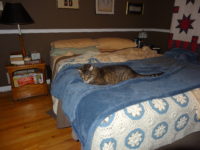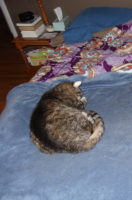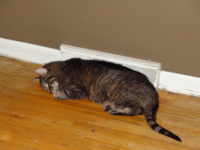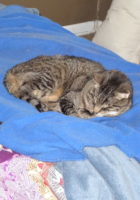 “To most people, Hans Huberman was barely visible. An un-special person…. He was always just there. Not noticeable. Not important or particularly valuable.” In the novel The Book Thief, Hans Huberman is the foster father of the main character, Liesel, and he’s not only my favorite character, but he’s also Liesel’s favorite person. The narrator explains how, to most people, he wouldn’t really stand out, yet to Liesel, his “thereness,” as the narrator puts it, is one of the key qualities she treasures in him: “The girl knew from the outset that Hans Huberman would always appear” when she needed him, “and he would not leave.”
“To most people, Hans Huberman was barely visible. An un-special person…. He was always just there. Not noticeable. Not important or particularly valuable.” In the novel The Book Thief, Hans Huberman is the foster father of the main character, Liesel, and he’s not only my favorite character, but he’s also Liesel’s favorite person. The narrator explains how, to most people, he wouldn’t really stand out, yet to Liesel, his “thereness,” as the narrator puts it, is one of the key qualities she treasures in him: “The girl knew from the outset that Hans Huberman would always appear” when she needed him, “and he would not leave.”
Matthew and I adopted Skittles, along with his father Linus, from a woman whose young son had developed sudden and severe allergies. Skittles was ten at the time, and we’ve never felt right about renaming older cats. We made a slight exception with him, though, in that his given name was Skittle, singular, and between our familiarity with the candy (which always seems to be referred to in the plural) and the fact that Matthew used to have a cat named Skittles, we unconsciously kept adding an “s,” so Skittles he became. As we got to know him better, however, we didn’t so often add the “s” as drop the “tle,” generally calling him “Skit” or “Skit Kit.”
We’d been warned before adopting Skit that he was shy and might spend most of his time under our bed, so we considered it a credit to our cat-whisperer skills that he was more often on the bed than under it, and if he was under it, he’d come out to greet us when we came in the room. What we didn’t know was that, comfortable as Skit seemed in the bedroom, he’d rarely leave it in the over two years he lived with us. To our relief, he learned to go to the basement for the litterbox, and we’d occasionally spot him on the main or lower level of the house, but most of the time, he stayed upstairs, usually in the bedroom. He was always just there.
Though warned of Skit’s shyness, we weren’t told until we met him that he was somewhat crippled from a kittenhood injury. Between this and his age, he wasn’t exactly agile, but since he didn’t seem to be in discomfort, and he could still climb stairs and jump up onto the bed, we found his gimpy gait to be part of his cuteness. We realized, nonetheless, that most people probably wouldn’t regard him as too special. He’d never win any beauty competitions or become a Cover Cat. “He’s a lover, not a looker,” we’d say. Despite his generally weighing about ten pounds, normal for an adult cat, he always looked scrawny, and although we’d scritch his head all the time, we hesitated to pet his back, because it was a bit disturbing to feel his spine. He also had an odd tail, unusually wide at the base, but then, about halfway down its length, narrowing abruptly and ending in a pointed tip. His claws wouldn’t retract all the way, clicking on our hardwood floors, and the “thumb” claw was freakishly large and thick and needed to be clipped to keep it from growing back into his paw.
During his time with us, Skit actually became even less physically attractive. He grew a large bulge on one of his shoulders; the vet diagnosed it as a lipoma, a fatty tumor that was unsightly but benign, so we decided not to traumatize Skit by having it removed. Before that, we did have the vet remove a cyst on his upper lip, leading to a couple weeks of his having to wear the “Cone of Shame.” Even after he was no longer our Cone Kitty, his face still wasn’t the loveliest, as he’d scratch his chin until it was raw or even bleeding. The vet suggested that it might be a contact allergy, so we changed blankets, which appeared to help.
We got Skit in the late spring, and he stayed on the bed much of the time for those first few months, but when the temperatures dropped, he’d hunker by the register, as if trying to absorb all the heat he could. With the return of warmer weather, he returned to the bed; however, after his second winter with us, he stayed by the register even as spring and summer came. Wanting to encourage him to get back on the bed, I suggested taking away the blanket we’d put on the floor, thinking that he’d seek a softer spot … yet after a few days of his continuing to hunker on the hardwood floor, we felt bad for his aging bones and gave him the blanket once again. For about a year, we could pretty much count on his being cutely curled up on that blanket whenever we entered the room. He was always just there.
 Or nearly always, at any rate. Grateful not to have to keep a litterbox upstairs, we did decide to humor Skit by bringing up a plate of canned cat food every day and by providing an upstairs bowl of water in the hall; we didn’t want to risk his dying of hunger or thirst. So Skit would regularly leave his blanket for food and water. He’d also leave it almost every night in what became an endearing ritual. He liked me but was especially fond of Matthew, and almost every night after we turned out the lights, we’d hear his clicking claws crossing the floor in a lurching, lub-dub, heartbeat rhythm, uneven because of his bad leg. Getting to the bed, he’d jump up on Matthew’s side and settle on his chest while we scritched his head and stroked his sides. These goodnight snuggles were important enough to Skit that when we were sleeping in the downstairs guest room, where it’s cooler and darker, he’d often venture out of his safe space to find us. Sometimes he’d come down to that room to see me even when Matthew wasn’t with me.
Or nearly always, at any rate. Grateful not to have to keep a litterbox upstairs, we did decide to humor Skit by bringing up a plate of canned cat food every day and by providing an upstairs bowl of water in the hall; we didn’t want to risk his dying of hunger or thirst. So Skit would regularly leave his blanket for food and water. He’d also leave it almost every night in what became an endearing ritual. He liked me but was especially fond of Matthew, and almost every night after we turned out the lights, we’d hear his clicking claws crossing the floor in a lurching, lub-dub, heartbeat rhythm, uneven because of his bad leg. Getting to the bed, he’d jump up on Matthew’s side and settle on his chest while we scritched his head and stroked his sides. These goodnight snuggles were important enough to Skit that when we were sleeping in the downstairs guest room, where it’s cooler and darker, he’d often venture out of his safe space to find us. Sometimes he’d come down to that room to see me even when Matthew wasn’t with me.
After about two and a half years of being blessed by Skit’s thereness, of feeling that he would always appear when we needed him and wouldn’t leave, we did the leaving ourselves by going out of town for a weekend. Notwithstanding Skit’s multiple minor maladies, he’d never shown signs of any major illness, and all our other cats seemed fine too, including the eighteen-year-old, so we didn’t have any concerns about leaving them for a couple days. Still, we arranged for a cat-sitter to look in on them, and before we left, I found all five so I could give them a farewell petting and tell them I loved them.
 I do this every time we go out of town, and every time we return, we start by looking for each of the cats, to make sure they’re all okay. We assumed they would be this time, too, but as I came into the bedroom, Skit wasn’t there on his blanket. This wouldn’t have alarmed me automatically except for what was on his blanket: he’d had diarrhea, something that had never happened before. Thinking he might be hiding under the bed, I lifted the covers and peered under the edge, but he wasn’t there. Just then, Matthew came upstairs and said, “I found Skit … in the basement by the litterbox…. He’s dead.” Everything had been fine when the cat-sitter had visited the day before.
I do this every time we go out of town, and every time we return, we start by looking for each of the cats, to make sure they’re all okay. We assumed they would be this time, too, but as I came into the bedroom, Skit wasn’t there on his blanket. This wouldn’t have alarmed me automatically except for what was on his blanket: he’d had diarrhea, something that had never happened before. Thinking he might be hiding under the bed, I lifted the covers and peered under the edge, but he wasn’t there. Just then, Matthew came upstairs and said, “I found Skit … in the basement by the litterbox…. He’s dead.” Everything had been fine when the cat-sitter had visited the day before.
The abruptness of Skit’s demise made it in some ways less emotionally grueling that when we’d lost cats in the past. We didn’t have to watch him suffer, realize he probably wouldn’t recover, make the awful appointment, and return home with an empty cat carrier. But I’m still not used to the fact that when we come to the bedroom and glance toward the wall by the heater, he’s no longer there.


